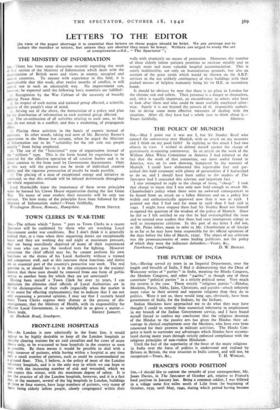LETTERS TO THE EDITOR
[in view of the paper shortage it is essential that letters on these pages should be brief. We are anxious not to reduce the number of letters, but unless they are shorter they must be fewer. Writers are urged to study the art of compression.—Ed., " The Spectator "I
THE MINISTRY OF INFORMATION
Stit,—There has been some discussion recently regarding the work of that section of the Ministry of Information which deals with the dissemination of British news and views in enemy, occupied and neutral countries. To anyone with experience in this field, it is Inconceivable that this work, after twelve months of conflict, is still carried out in such an amateurish way. No improvement can, however, be expected until the following basic essentials are fulfilled: (a) Recognition by the War Cabinet of the necessity of broadly defining Peace Aims.
(2) In respect of each nation and national group affected, a scientific analysis of the people's state of mind.
(3) Arising out of the above, the formulation of a policy and plan for the distribution of information to each national group affected.
(4) The co-ordination of all activities relating to each area, so that they do not result in a conflict, and thus a weakening, of propaganda effect.
(5) Placing these activities in the hands of experts instead of amateurs. In other words, taking real note of Mr. Beverley Baxter's exhortation in the House last autumn, when he urged the Minister of Information not to let " suitability for the job rule out people entirely " from being employed.
(6) The use of the " functional " type of organisation instead of the " military " type. This is the form found by experience to be essential for the effective operation of all creative bodies and is in direct contrast to the form used by Government departments. Only in this way will the greatest use be made of individual creative ability and the vigorous prosecution of results be made possible.
(7) The placing of a man of exceptional energy and initiative in command, so that this attitude will be infused downwards throughout the whole organisation.
Lord Northcliffe knew the importance of these seven principles when he formed his Crewe House organisation during the last Great War. To many of your readers their necessity will be only too obvious. Yet how many of the principles have been followed by the Ministry of Information today2—Yours faithfully,
Woodington House, Romsey, Hampshire. PETER NEVILE.






























 Previous page
Previous page